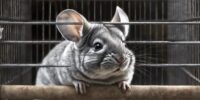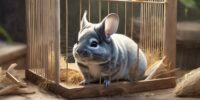How to Ensure Your Chinchilla Gets Enough Water
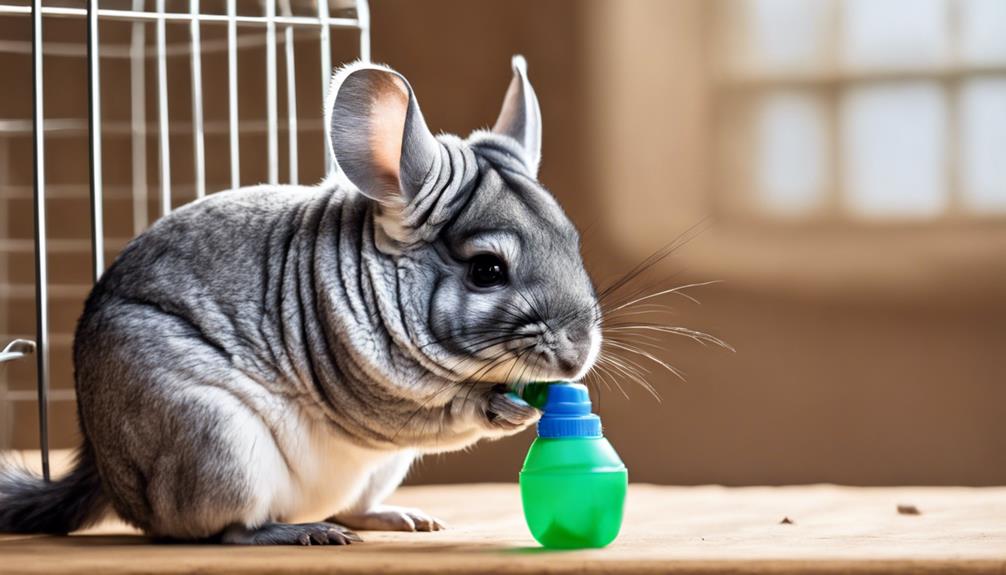
To ensure your chinchilla gets enough water, there are several key strategies you can implement. Firstly, make sure to provide fresh, clean water in a water bottle or bowl at all times. Chinchillas have high water requirements, so it’s crucial to check and refill the water container daily. Additionally, you can offer water-rich foods like fresh vegetables and fruits to help keep your chinchilla hydrated. Lastly, monitor your chinchilla’s water intake and behavior to ensure they are drinking enough to stay healthy and hydrated.
Implementing these strategies will help maintain your chinchilla’s hydration levels and overall health. Remember that proper hydration is essential for your chinchilla’s well-being, so make it a priority in their care routine.
Importance of Hydration for Chinchillas
Ensuring proper hydration is essential for chinchillas to maintain their overall health and well-being. Hydration benefits these small mammals in various ways. Adequate water intake is crucial for digestion, as it helps chinchillas break down food efficiently and prevents gastrointestinal issues. Additionally, staying hydrated supports proper organ function, aiding in processes like circulation and waste elimination.
Water intake regulation is a critical aspect of chinchilla care. Unlike some animals, chinchillas don’t have a strong thirst drive, so they may not actively seek out water even when they need it. This makes it essential for chinchilla owners to monitor their pets’ water consumption closely. Providing fresh water daily and checking that water bottles are working correctly can help ensure chinchillas have access to the hydration they need.
Understanding Chinchilla Water Needs
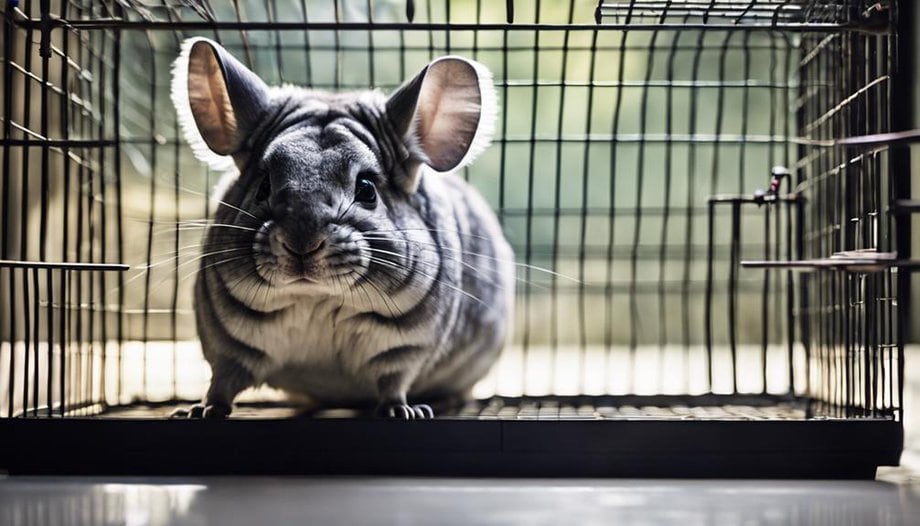
Chinchillas have specific water needs that are crucial for their overall health and well-being. Proper hydration is essential to prevent health issues and ensure your chinchilla’s well-being. Here are some key points to consider:
- Water bottle alternatives: Chinchillas typically drink from water bottles attached to their cage. However, some chinchillas may prefer drinking from bowls. It’s essential to observe your chinchilla’s preference and provide a suitable water dispenser accordingly.
- Hydration tips: Ensure fresh water is available at all times. Chinchillas are prone to dehydration, so monitor their water intake regularly. Additionally, consider adding water-rich foods like fresh vegetables to their diet to help increase their overall hydration levels.
- DIY water dispensers: If you opt for a DIY water dispenser, ensure it’s secure, leak-proof, and easy for your chinchilla to access. Regularly clean and refill the dispenser to maintain hygiene.
Monitoring your chinchilla’s water intake and providing suitable water dispensers are crucial steps in meeting their hydration needs.
Choosing the Right Water Dispenser
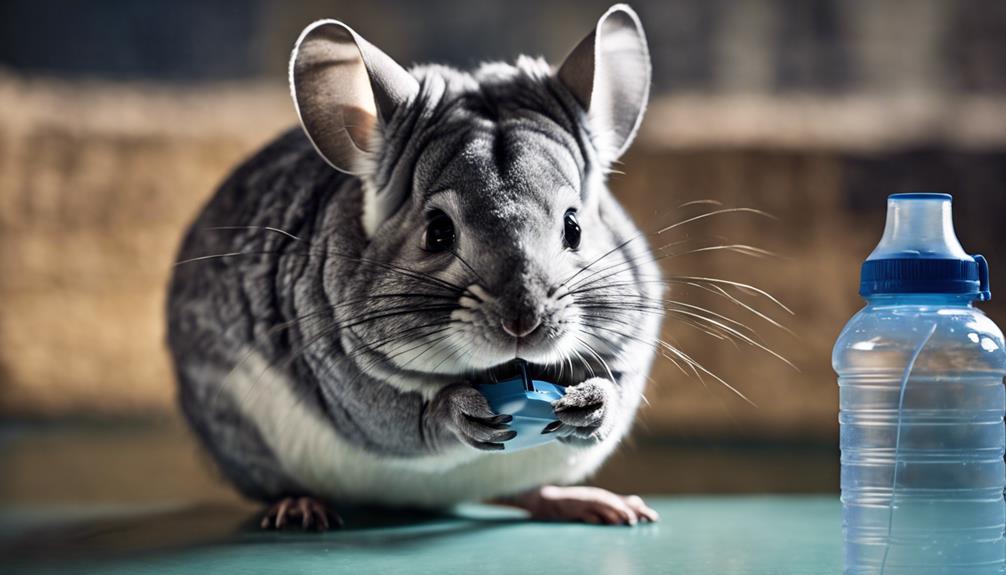
When selecting a water dispenser for your chinchilla, consider the different types available and their benefits.
Proper maintenance of the dispenser is crucial to ensure clean and safe drinking water for your pet.
Understanding these points will help chinchilla owners make informed choices regarding their pet’s hydration needs.
Dispenser Types Overview
What factors should be considered when selecting the appropriate water dispenser for a chinchilla?
When choosing a water dispenser for your chinchilla, it’s essential to consider the following:
- Water bottle vs bowl: Decide whether a water bottle or a bowl is more suitable for your chinchilla. Water bottles are typically cleaner and prevent bedding contamination, while bowls allow chinchillas to drink more naturally.
- Gravity vs vacuum dispensers: Choose between gravity-fed or vacuum dispensers. Gravity dispensers release water as the chinchilla drinks, while vacuum dispensers require the chinchilla to actively push a ball bearing to access water. Consider your chinchilla’s behavior and preferences when making this choice.
Ensuring the right dispenser type is crucial for your chinchilla’s hydration needs.
Maintenance Tips for Dispensers
To maintain optimal functionality and cleanliness of a water dispenser for your chinchilla, regular cleaning and inspection are essential tasks. Cleaning frequency is crucial to prevent bacteria growth and ensure your chinchilla has access to clean water. It is recommended to clean the dispenser at least once a week with mild soap and warm water. Additionally, dispenser placement plays a key role in your chinchilla’s hydration. Ensure the dispenser is securely attached to the cage at a height that is easily accessible for your chinchilla but out of reach of bedding or droppings. By following these maintenance tips, you can provide a safe and hygienic water source for your beloved chinchilla.
| Maintenance Tips for Dispensers | ||
|---|---|---|
| Cleaning Frequency | Dispenser Placement | |
| At least once a week | Securely attached at an accessible height |
Monitoring Water Intake Daily
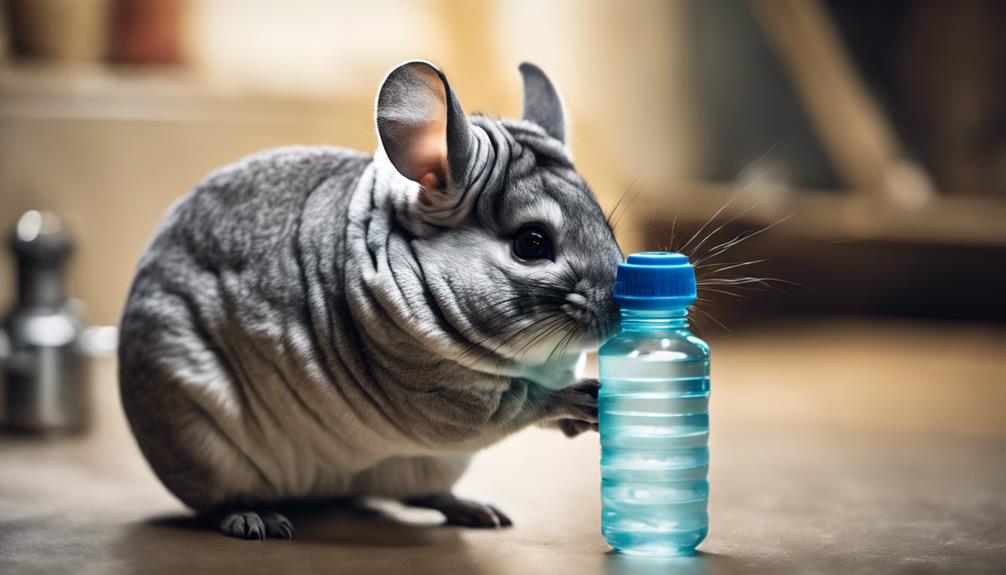
Chinchilla owners should make it a habit to track their pet’s daily water intake meticulously. By observing the hydration levels and monitoring water consumption closely, they can ensure their chinchilla stays healthy and hydrated.
This practice is crucial in preventing dehydration and catching any potential health issues early on.
Daily Water Intake Tracking
How can one effectively monitor their chinchilla’s daily water intake to ensure proper hydration levels are maintained?
Daily monitoring of a chinchilla’s water intake is crucial for their well-being. Here are some ways to track progress:
- Measure Water Bottle Levels: Keep an eye on the water bottle levels each day and note how much water your chinchilla consumes.
- Use a Water Intake Log: Create a simple log to record the amount of water your chinchilla drinks daily.
- Observe Behavior Changes: Monitor your chinchilla for signs of dehydration such as lethargy or dry skin, which can indicate inadequate water intake.
Hydration Level Observation
Monitoring a chinchilla’s daily water intake levels is essential to ensuring proper hydration. Hydration level monitoring involves observing how much water your chinchilla consumes each day.
To assess water intake accurately, use a water bottle to measure the amount of water your pet drinks. It’s important to keep track of any changes in your chinchilla’s drinking habits, as sudden increases or decreases could indicate an underlying health issue.
Ensure the water bottle is securely attached to the cage and positioned at a comfortable height for your chinchilla to access easily. By consistently monitoring your chinchilla’s water intake, you can proactively address any hydration issues and promote your pet’s overall well-being through proper hydration.
Water Consumption Monitoring
To ensure optimal hydration levels for your chinchilla, establishing a routine for monitoring its daily water intake is crucial for maintaining its health and well-being. Tracking your chinchilla’s water consumption is a vital aspect of responsible pet ownership.
Here are some key points to consider when monitoring your chinchilla’s water intake:
- Observe Water Bottle Levels: Regularly check the water bottle to ensure your chinchilla has access to an adequate water supply.
- Track Wetness of Bedding: Monitor the dampness of your chinchilla’s bedding as an indicator of water consumption.
- Consult a Veterinarian: If you notice any sudden changes in your chinchilla’s water intake, consult a veterinarian to rule out any underlying health issues.
Offering Fresh Water Sources
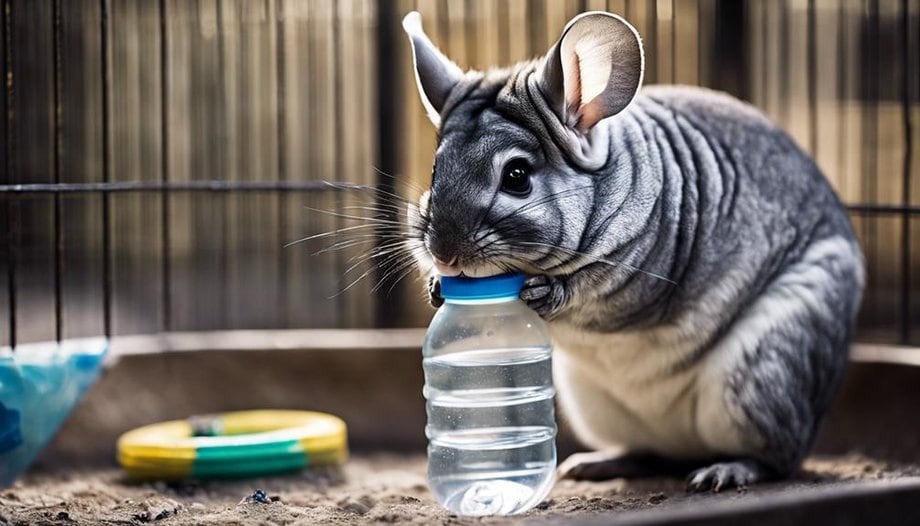
Providing a variety of fresh water sources is crucial for ensuring your chinchilla stays properly hydrated and healthy. When it comes to offering water to your chinchilla, consider using water bottle alternatives like sipper tubes or glass water bottles. These options help prevent contamination and ensure a fresh supply of water. Chinchilla water bowls are another good choice, but make sure they’re heavy and stable to prevent tipping.
For chinchilla hydration on the go, portable water options are essential. Small travel water bottles with leak-proof seals can be convenient when transporting your chinchilla. Additionally, collapsible water bowls are great for outings or traveling with your pet. Having these portable water options readily available ensures your chinchilla can stay hydrated no matter where you are.
Hydration Tips for Chinchillas
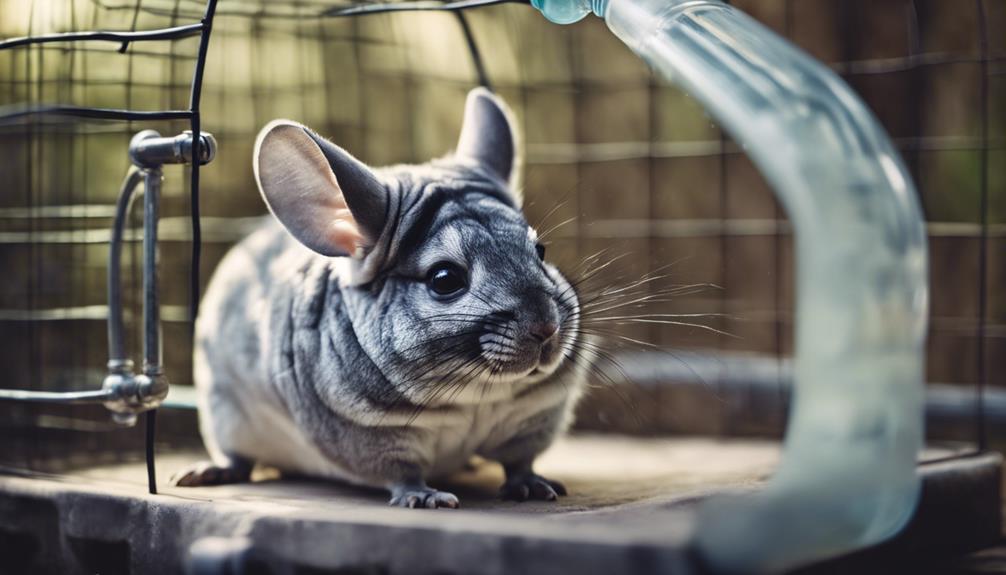
To ensure optimal hydration for your chinchilla, incorporating moisture-rich foods into their diet can play a crucial role in maintaining their water intake levels. In addition to diet, providing fresh water is essential for your chinchilla’s well-being. Here are some hydration tips to help you keep your furry friend properly hydrated:
- Water bottle vs bowl, pros and cons
- Water Bottle: A water bottle can help prevent contamination and spills, ensuring a clean water supply for your chinchilla. However, some chinchillas may find it challenging to drink from a water bottle, especially if they aren’t used to it.
- Water Bowl: A water bowl is more natural for chinchillas to drink from, mimicking how they’d drink in the wild. However, bowls can get easily contaminated with bedding or feces, requiring frequent cleaning to maintain water quality.
- Chinchilla hydration myths
- Myth: Chinchillas don’t need much water – False! Chinchillas need a constant supply of fresh water to stay hydrated and healthy.
- Myth: Chinchillas can meet their hydration needs solely from foods – While some foods have moisture, chinchillas still require access to fresh water to stay properly hydrated.
Consulting a Veterinarian When Needed
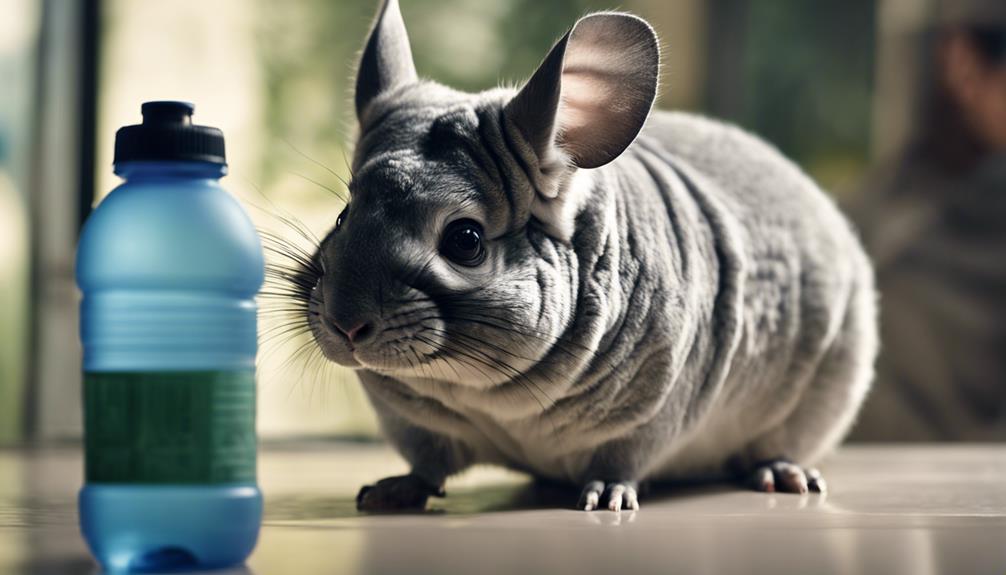
When considering the health and well-being of your chinchilla, consulting a veterinarian is crucial for addressing any medical concerns or health issues that may arise. Veterinarians can provide professional advice tailored to your chinchilla’s specific needs, offering vet recommendations on diet, hydration, and overall care.
If your chinchilla experiences any health concerns, such as sudden weight loss, changes in appetite, lethargy, or difficulty breathing, seeking veterinary assistance promptly is essential. These could be signs of underlying medical conditions that require immediate attention.
In emergency situations, where your chinchilla shows severe symptoms like seizures, profuse bleeding, or trauma, contacting a veterinarian without delay is crucial. Veterinarians have the expertise to diagnose and treat various chinchilla health issues effectively. They can also guide you on preventive measures to ensure your chinchilla’s well-being in the long run.
Regular check-ups with a veterinarian can help catch any potential health problems early on, promoting a healthy and happy life for your beloved pet.
Frequently Asked Questions
Can Chinchillas Drink Tap Water, or Should They Only Drink Filtered or Bottled Water?
Chinchillas can drink tap water, but providing filtered or bottled water is ideal for ensuring optimal water quality. Hydration is crucial for chinchilla care, with proper water intake essential for their health and well-being.
How Often Should I Clean My Chinchilla’s Water Dispenser to Ensure It Stays Clean and Safe for Them to Drink From?
To maintain a safe water source for chinchillas, regular cleaning of the water dispenser is essential. Experts recommend cleaning it at least once a week to prevent bacterial growth and ensure water quality.
Are There Any Specific Signs or Symptoms of Dehydration in Chinchillas That I Should Be Aware Of?
Chinchillas are prone to dehydration, leading to symptoms like sunken eyes, dry mouth, and reduced urination. To prevent this, ensure adequate water consumption, maintain a clean water source, and monitor their health closely for any signs of dehydration.
Can Chinchillas Get Enough Water From Fresh Fruits and Vegetables, or Do They Solely Rely on Water From Their Dispenser?
Chinchillas can benefit from hydration from treats like fresh fruits and vegetables, but they primarily rely on water from their dispenser for adequate hydration. Water bottle alternatives are essential to ensure they stay properly hydrated.
Are There Any Alternative Methods for Ensuring My Chinchilla Stays Hydrated, Aside From Monitoring Their Water Intake Daily?
To ensure chinchillas’ hydration, it’s crucial to provide fresh vegetables like cucumber and celery, which contain high water content. Incorporating these into their diet can supplement their water consumption habits, promoting overall health and hydration.

